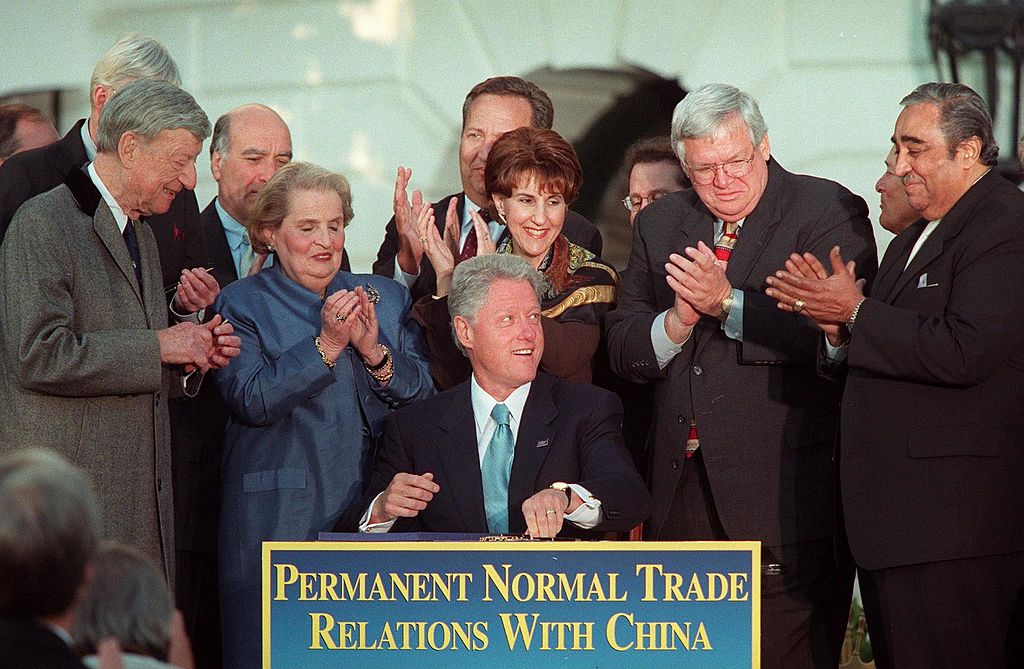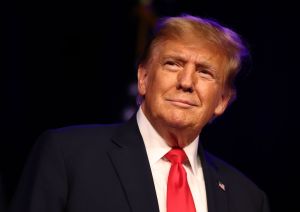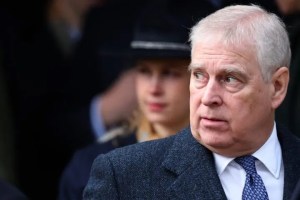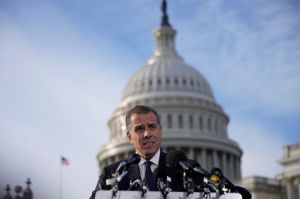It seems this virus is fiercely contagious but far less lethal than first supposed. The argument now is whether we should be emerging from lockdown and getting back to the business of business.
The Trump faction, some 50 percent of our country, are straining at the bit to go back to work. Democratic leadership and the left-leaning media are against breaking lockdown. Why?
It’s the usual knee-jerk ‘Orange Man Bad’ anti-Trumpism and a shivering fear that Trump can rebuild our economy in time for the coming election. But the economy cannot be fully restored without addressing the most complicated question: what to do about China?
Twenty years ago China was a developing nation, albeit one shaking a military fist externally and crushing dissent internally. At that time when you thought of China, you thought ‘Tiananmen Square’. Then, in the year 2000, Bill Clinton, harking back to the League of Nations nostalgia of Woodrow Wilson, formulated his own grand idea. If he could bring China into the wider economic world and expose it to western liberal ideas, China would naturally bask in the glow of prosperity, moderate its cranky behavior and become a solid market for western products. Accordingly, in his speech at Johns Hopkins (now virtually ‘forgotten’ by friendly media) he said: ‘By joining the World Trade Organization, China is not simply agreeing to import more of our products; it is agreeing to import one of democracy’s most cherished values: economic freedom.’ The naiveté of that statement is astonishing; all its assertions are spectacularly wrong.
Clinton was nevertheless followed by Bush II (himself a believer in exporting democracy) and then the Obama/Biden administration, which, as we will see, saw the Clinton opening as a potential profit center. But first, some relevant background. As World War Two was winding down, an ailing FDR was rushing to shorten the hostilities and re-order the post-war world. To the chagrin of Churchill, FDR bargained away some eastern European sovereignty to Stalin, on the understanding that Russia would join in assaulting Japan from Asia as America invaded by sea. In a twist of fate, FDR died and it was Truman who attended the Potsdam Conference. There was no bonhomie between Truman and Stalin. As a matter of fact, Truman did not tell Stalin he had the atomic bomb. Nor did Churchill. Truman unleashed it on Japan, ending the war and the Red Army never set foot in Tokyo. In his memoirs Churchill said of Truman ‘we not only speak the same language, we think the same thoughts’.
The hot war in Europe was replaced by the Cold War almost seamlessly. Europe was a broken landscape with Stalin’s massive army in the field. Truman not only faced down its attempt to annex all of Berlin, he set about rebuilding an exhausted western Europe of 17 countries with the Marshall Plan (European Recovery Plan). This three-year project resulted in a massive success by recreating those 17 countries and opening a gigantic market for American goods made in America by American workers. (His Point 4 program of technology for democracies threatened by internal and external authoritarians was also successful in Israel and India, perhaps somewhat less in Pakistan and Jordan).
Fast forward to 1984: Mrs Thatcher invited Gorbachev to Britain and after lengthy discussions concluded ‘we can do business with this man’. A few days later she flew to meet Reagan at Camp David to convince him of that. The Iron Lady pulled this off in between juggling the Hong Kong handover and dealing with a miners’ strike at home. In dealing with Gorbachev, Reagan continually let him know on every point he would ‘trust but verify’. Those very words constitute a rhyming Russian proverb, one of a few employed by Reagan.
By the mid-Nineties, there was 55 years of unbroken American and western policy of helping allies but also, and crucially, dealing with adversaries in a straightforward way.
Bill Clinton turned that all upside-down. He blundered into something called an Agreed Framework to halt nuclear production by North Korea in return for supplying that regime with energy and equipment. The oxymoronically named Agreed Framework was handed off to Bush II, and North Korea promptly un-agreed. Kim kept the equipment.
Next, in 2000, Clinton brought China into the World Trade Organization. It would be charitable to pass it off as a mere mistake; it is nothing short of a disaster for which we have this Wu-Flu to bear. Clinton did a whole lot more, of course: Nafta and an incipient TPP, more gutting of jobs in the west for cheap production of shoddy goods.
***
Get three months’ free access to The Spectator USA website —
then just $3.99/month. Subscribe here
***
Clinton’s assurances that ‘China would buy our products’ was a few miles short of the reality. Much of our manufacturing base and our supply chains were gifted to China. China now plunders our innovations and expands militarily in the Pacific and in the Antarctic. Obama/Biden viewed the Clinton model as applicable to Ukraine and Iran, as well as an invitation for their friends and relatives to cop ancillary benefits of minor personal value in exchange for closing their eyes to what was going on below the waterline.
Trump campaigned against this pattern of trusting and not verifying. He crossed out the job-gutting trade deals, he withdrew from Obama’s Iran ‘deal’ and he took on China. The establishment didn’t even blink; they impeached. When WuFlu gained traction, they even tried to blame Trump for that too. Institutions take much time to build. We have seen how quickly they can be rubbished.


















